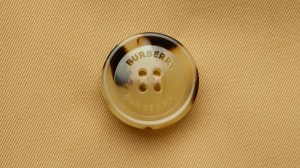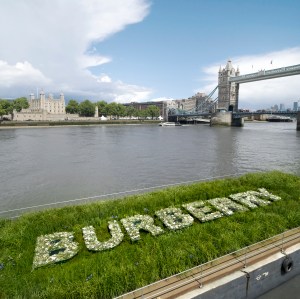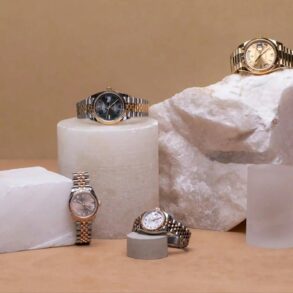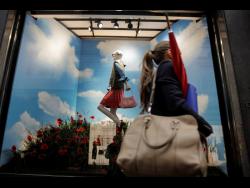LONDON — Burberry has become the latest luxury name to team with Vestiaire Collective with a plan to offer customers in the U.K. and the U.S. credit in exchange for their pre-owned women’s outerwear and handbags.
As of Thursday, customers will be able to trade in their merchandise on the Burberry x Vestiaire Collective platform. In exchange, they’ll receive a Burberry gift card based on the value of the item.
The Burberry merchandise will be authenticated and valued by Vestiaire, and then be available to purchase globally via the platform.
The partnership with Vestiaire is part of the wider ReBurberry program, which focuses on circular initiatives for customers, and supports Burberry’s stated aim to keep products and materials in use for longer.

Burberry is teaming with Vestiaire Collective on a circularity exchange project.
Giorgio Belloli, Burberry’s chief digital, customer and innovation officer, said, “in building on our existing circular initiatives, including our aftercare services through our ReBurberry program, we hope that these pieces can continue to be enjoyed for generations to come.”
Fanny Moizant, cofounder and president of Vestiaire Collective, said the partnership with Burberry “celebrates longevity and represents a step forward towards circularity. It is Vestiaire Collective’s mission to support brands to promote resale, and to offer more [opportunities] to buy less but buy better.”
Over the past few years Vestiaire has taken on board a series of luxury partners, including Gucci, Chloé, Alexander McQueen, Mulberry, Paco Rabanne, Courrèges, Mytheresa, Giglio and LuisaViaRoma, coming up with different resale and exchange models.
As part of the new partnership, Burberry has also donated a selection of women’s heritage trenchcoats to Vestiaire.
The sale price of those items will be donated to the U.K.-based charity Smart Works, which provides interview clothes and coaching to unemployed women as they look to enter, or return to, the workforce. Burberry has supported Smart Works since 2013, regularly donating racks of clothing, and offering styling services.

Burberry created a floating meadow on the Thames as part of its sponsorship of Queen Elizabeth’s Platinum Jubilee in 2022.
Courtesy image
The company has also begun offering refresh services for leather goods, trenchcoats and other product categories.
Today, more than 300 stores across 33 countries and territories offer one or more aftercare services. Nearly 45,000 products were repaired or refreshed using the aftercare services during the fiscal year that ended in March, Burberry said.
Burberry has also been donating tens of thousands of meters of fabric to more than 30 fashion schools and universities across the U.K. as part of the ReBurberry Fabric program, in partnership with the British Fashion Council.
The British luxury brand is working toward reducing its own impact by sourcing more sustainable, recycled or certified fabrics, and by restoring and regenerating natural ecosystems in the areas where it sources raw materials.
It has rolled out labelling across all key product categories in a bid to show how each product is meeting sustainability requirements.
Pistachio-colored labels have been attached to Burberry products. They outline key sustainable elements of a particular garment, and how it has met certain “positive attributes” criteria set out by the brand.
Those attributes include the amount of recycled natural fibers; delivery against carbon emissions standards; and social policies such as living wages for workers.
This post was originally published on this site be sure to check out more of their content.




